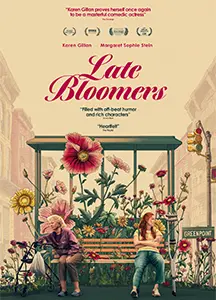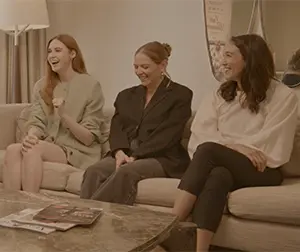
“Late Bloomers” is a darkish comedy from author Anna Greenfield, director Lisa Steen, starring Karen Gillan, Margaret Sophie Stein, Jermaine Fowler, Kevin Nealon, and Talia Balsam. Within the movie, Louise (Gillan), a 28-year-old Brooklynite adrift in life, finds herself abruptly single and grappling together with her id as a musician. In the meantime, her mom’s dementia is quickly progressing (Balsam). Louise crosses paths with Antonina (Stein), a cantankerous aged Polish girl who speaks no English. Reluctantly, Louise takes on the function of Antonina’s caregiver. As they navigate their begrudging relationship, they confront the realities of getting older, forcing Louise to think about her personal journey into maturity.

We sat down with Anna, Lisa and Karen to debate the movie and the themes of caregiving, humor, and connections between these impacted by dementia.
Anna, the movie is partially primarily based on a few of your individual private experiences. Receiving a analysis in a household isn’t simple. What was receiving that information like for you?
Anna: I used to be residing in New York when my mother was recognized with “aphasia,” which “would possibly result in dementia” at a hospital in California. To be completely sincere, I both didn’t perceive or didn’t wish to perceive the severity of the information. On the time, I didn’t know that she additionally had acquired a prognosis of three to 5 years to reside. I’ll at all times look again on that telephone name and wonder if it was my mother’s want to maintain the illness a secret or my very own unwillingness to hear that prevented the total fact from popping out. I believe my dad was attempting to guard me, not burden me, however on the identical time, I believe he didn’t suppose I used to be grown up sufficient to cope with that sort of information. I felt very alone, scared and in denial.
At what level did you’re feeling it was time to start out sharing your dementia expertise by way of your writing? Was it troublesome? Was it cathartic? How was that course of for you?
Anna: I believe it’s a actually exhausting illness to open up about. My household was extremely non-public when my mother was recognized. I discovered that to be fairly exhausting. I felt like my household wasn’t getting the help they may have. There was a sure disgrace round it, too. I believe as soon as there was sufficient distance and sufficient time had passed by, I used to be in a position to write about it. Getting the blessing of my household to cope with it in the way in which I wanted to, was essential. So, I wrote a film!
Lisa and Anna, you beforehand labored collectively on the quick movie “Sundowners,” which tackled related themes however another way. Inform us about the usage of humor in “Late Bloomers” to handle subjects that may be troublesome to discover.
Anna: I believe anyone who has skilled Alzheimer’s with a member of the family has observed there are a variety of humorous issues that may occur. That is the way in which that we will get by way of actually exhausting instances typically. Simply since you’re going by way of one thing, doesn’t suggest you’ve got misplaced your humorousness or misplaced your sense of absurdity. You are able to do it with out making enjoyable of it.
Lisa: Anna’s additionally the funniest particular person I do know.

Karen: I imply, she’s simply essentially the most unimaginable author. It feels so relatable and actual. I believed the story was simply extremely lovely. It isn’t one thing I’ve handled firsthand, however it was one thing I actually needed to discover and perceive extra about.
Speak just a little bit concerning the significance of authenticity with regards to portraying the illness on display screen.
Anna: Talia who performs the mom, who has frontotemporal dementia, took it actually critically. I talked to her about my mother, despatched her photos, and he or she did her personal analysis. Speaking about humor, I do suppose a variety of the stuff we see in leisure about Alzheimer’s and dementia may be very critical and really tragic. And it’s. However in case you’re taking part in that half, I believe you possibly can’t get too wrapped up in how unhappy it’s as a result of for that particular person, you do not know what they’re experiencing. You (to Lisa) needed to sort out stuff about my household, and you probably did it so effectively.
Lisa: I really feel like I filtered a variety of stuff by way of you (Anna). I needed to know what the genuine expertise was like. My grandmother had Alzheimer’s so I noticed just a little little bit of it.
Karen: Anna was simply essentially the most unimaginable useful resource. There’s nothing higher than talking to any individual who’s truly lived by way of it when it comes to attempting to be genuine in your individual efficiency.
Karen, are you able to discuss getting ready for the function of somebody who has abruptly discovered themselves within the function of a caregiver?
Karen: A number of talking to Anna and listening to quite a bit about her experiences. I exploit a variety of creativeness in my job. I imagined myself being thrown right into a caregiving function and the way inept I’d be. You must make sacrifices, and I am certain there’s a little bit of guilt that you just’re wrestling with on the identical time, however in the end, you are going to do what’s proper.
Research have proven that as we age, it is essential to have wholesome habits like consuming effectively, train and attempting new issues. A few of that’s proven within the movie. Are there issues that you just do to unwind? A wholesome behavior?
Karen: I performed the piano once I was youthful, from the age of seven. I gave up once I was 16 and I can not bear in mind very a lot. However lately, I had some downtime. I used to be like, I will take up piano classes once more. I felt just like the youthful model of me once more. Reconnecting with one thing. It simply felt actually good. I bought a variety of endorphins from that.
Anna: I believe it is actually good to your mind. Piano particularly, I imply, my mother was taking part in and doing that as she was declining. And also you (Karen) sing on this film.
Karen: There’s a cheeky music.
Anna: That was a giant connection for my mother and I. That originated as a result of she’d misplaced her voice, however I had these combine CDs she would make, as a result of she was a DJ. She had these Sandy Denny songs on the CD. When she would play it I would be like, “Oh that is embarrassing folks music.” However listening to it as an grownup, I used to be like,” That is so good, so unhappy.” Music linked us once I was having a tough time truly connecting to her.
Within the movie, there are numerous communication limitations between characters, together with in fact the literal language barrier between Louise and Antonina. We’ve mentioned music being a technique to join, however discuss extra about creating connections that transcend conventional language.
Lisa: We had a variety of rehearsal time with Karen and Margaret earlier than taking pictures, which was wonderful, and in order that they may get to know one another. And I believe it helped with creating sort of a rapport in order that after they’re in these scenes, the place they are not truly speaking to one another there, you possibly can really feel the chemistry between them. And you may sort of see the dynamic between them. As a result of it’s a lot about having the ability to talk with out language due to Anna’s mother and, and the way her illness manifested.
Anna: As a result of her illness manifested that manner, I grew to become sort of obsessive about what you do when you possibly can’t discuss to any individual. You do all types of issues to attempt to hook up with them. Music was an enormous one. Typically it simply seems to be and glances and you’re taking that means the place you discover it.
Karen: I imply, a lot of the communication, I’d say is just not verbal. The phrases are a small proportion of communication and I am aware of that from an actor’s standpoint
Anna, what did you find out about your self from being touched by dementia so personally?
Anna: I discovered that it’s actually exhausting to ask for assist. There’s a sure social disgrace round dementia that I noticed existed once I was out in public with my mother.Others appeared to be uncomfortable by a few of her habits. I needed to recover from my very own ego with a view to be a superb caregiver for my mother. I additionally needed to notice the bounds of my expertise. I’m not an expert caregiver and my mother deserved to be secure. Typically, household could make the worst caregivers — it’s exhausting to overlook who this particular person was. We’d anticipate them to sooner or later get up once more as themselves and discover the reality that they by no means will, too exhausting to bear. I needed to study to place apart my very own fears of the unknown with a view to see extra clearly what was truly finest for my mother.
What are you hoping that audiences take away from watching this movie?
Lisa: By way of the caregiving facet of it, the film’s not about being an expert nurse. Typically you make errors, and you then get well from these errors. That does not make you a foul particular person. I believe that is the primary factor that we wish folks to remove.
What message do you have got for households impacted by dementia?
Anna: Attain out for assist. Share what’s occurring with you. You may be dissatisfied by the shortage of help from some in your neighborhood, you may be very stunned by the individuals who step as much as the plate in your life. It’s cliché however all cliché stuff exists as a result of we have to hear what we have now in widespread — you’re not alone.
About: “Late Bloomers” is produced by Alexandra Barreto, Taylor Feltner, and Sam Bisbee. The movie was launched on June 7, 2024 by Vertical. It’s accessible on streaming platforms and VOD, together with Apple TV and Amazon Prime Video.



